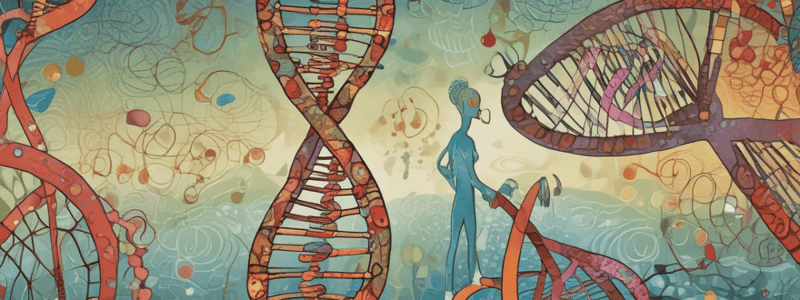Podcast
Questions and Answers
What is the primary cause of genetic disease?
What is the primary cause of genetic disease?
- Functional genomics
- Epigenetic changes
- Chromosomal variation
- Genetic variation (correct)
What is the term for a difference in a single nucleotide?
What is the term for a difference in a single nucleotide?
- Copy Number Variant (CNV)
- Single Nucleotide Variant (SNV) (correct)
- Genetic variant
- Chromosomal Variation
What is the term for a distinct sequence of nucleotides representing the unit of genetic information?
What is the term for a distinct sequence of nucleotides representing the unit of genetic information?
- Genetic variant
- Allele
- Genome
- Gene (correct)
Which of the following is an example of a genetic disease?
Which of the following is an example of a genetic disease?
What is the term for the complete set of DNA in an organism?
What is the term for the complete set of DNA in an organism?
What is the term for a change in the nucleotide sequence of the DNA?
What is the term for a change in the nucleotide sequence of the DNA?
Which of the following is an example of an epigenetic disease?
Which of the following is an example of an epigenetic disease?
What is the term for repetitive elements comprised of recurring DNA motifs of 2–6 bases?
What is the term for repetitive elements comprised of recurring DNA motifs of 2–6 bases?
Flashcards are hidden until you start studying
Study Notes
Genetic Variation and Genetic Disease
- Cystic Fibrosis (CF), Huntingdon's Disease (HD), and psoriasis are examples of genetic diseases resulting from genetic variation.
- Genetic variation refers to changes in the nucleotide sequence of the DNA.
Epigenetic Changes and Epigenetic Disease
- Fragile X syndrome is an example of an epigenetic disease resulting from epigenetic changes.
Functional Genomics and High-Throughput Technologies
- Functional genomics involves the study of the function of genes and their products.
- High-throughput technologies enable the analysis of large amounts of genetic data.
- Population-based initiatives are used for stratified medicine, which involves tailoring medical treatment to individual patients based on their genetic characteristics.
Glossary of Key Terms
- Genome: an organism's complete set of DNA.
- Gene: a distinct sequence of nucleotides representing the unit of genetic information.
- Allele: each of two or more alternative forms of a gene that arise by variation.
- Genetic variant: a change in the nucleotide sequence of the DNA.
- SNV (Single Nucleotide Variant): a difference in a single nucleotide.
- CNV (Copy Number Variant): insertion, deletions, inversion, and duplications of greater than 1,000 nucleotides.
- Chromosomal Variation: variation in chromosome number, including multiple sets of chromosomes.
- STRs (Short Tandem Repeats): repetitive elements comprised of recurring DNA motifs of 2–6 bases.
Studying That Suits You
Use AI to generate personalized quizzes and flashcards to suit your learning preferences.




